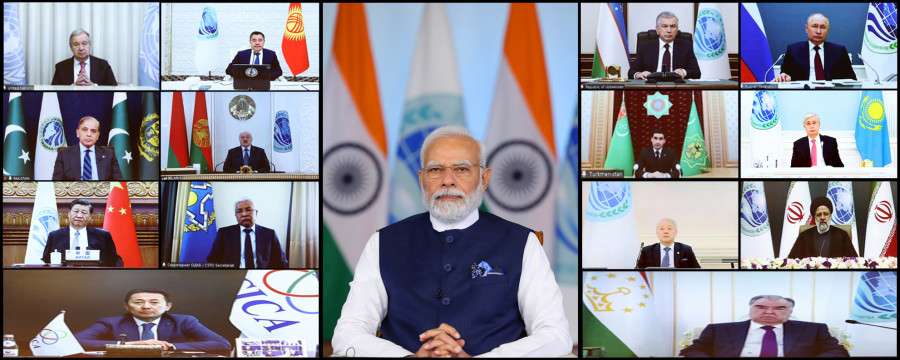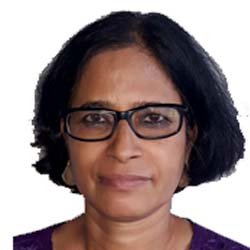Columns
Navigating global power competition
G20 chair India is at the forefront of pushing reformed multilateralism as its foreign policy.
Smruti S Pattanaik
The recent Shanghai Cooperation Organisation (SCO) summit hosted by India and an upswing in its relationship with the United States, coupled with the Indian prime minister's recent visits to Egypt, the United Arab Emirates and France has shown how India navigates complex geopolitics and attempts not to fall into the trap of getting into the neo-Cold War dynamics that is marked by increasing competition between the US and China. India is part of several multilateral organisations, prominent among them are BRICS (Brazil, Russia, India, China and South Africa), Association of Southeast Asian Nations (ASEAN), Indian Ocean Rim Association (IORA), South Asian Association for Regional Cooperation (SAARC) and Bay of Bengal Initiative for Multi-Sectoral Technical and Economic Cooperation (BIMSTEC). India has historically championed the cause of Africa which is reflected in Prime Minister Modi's proposal for the inclusion of the African Union as a G20 member.
India is also part of the Quadrilateral Security Dialogue (QUAD) in which China remains a major concern for the member states, and the Indo-Pacific Economic Forum, an economic initiative led by the US. India has used multilateral forums to hold dialogue with crucial bilateral partners while waiting for an opportune moment to initiate formal dialogue to iron out differences. Indian External Affairs Minister Subrahmanyam Jaishankar and China's top diplomat Wang Yi recently discussed easing military tensions between their countries. This was seen at the India-China meeting on the sidelines of the ASEAN foreign ministers' meeting in Jakarta.
In the past decade or so, India has articulated its position on the import of discounted Russian crude oil while putting across its point of view that this is not an era of war. It has refused to take a position and condemn Russia on the war in Ukraine, and has argued for a cessation of hostilities and dialogue. India has re-exported Russian oil to third countries after refining it. European Union Foreign Minister Josep Borrell recently stated that the EU should not buy this oil from India.
Effective tool
India as the G20 chair is also at the forefront of pushing reformed multilateralism as its important foreign policy agenda. This commitment towards multilateralism stems from the view that a multipolar world will allow India the space to play a significant role in shaping world politics—from highlighting its concerns regarding climate change, multilateral economic order, cyber security and technological innovations and moving towards a rule-based order through several such initiatives. In the post-Cold War period with US power in relative decline, this objective has become worth pursuing as several countries juggle the systemic limitation to rise in the international system.
Historically, India was opposed to a bipolar bloc politics, and it became one of the founding members of the Non-Aligned Movement that was tailored to keep newly independent countries away from bloc politics and enable them to pursue an independent foreign policy. As reform of the United Nations remains a distant dream, India has pursued a policy of engaging several multilateral regional institutional mechanisms to further its foreign policy objectives and play a larger visible global role. It has been active in several institutional mechanisms that, to a large extent, is playing a noteworthy role in furthering geo-political and geo-economic agenda of member states beyond the United Nations. India has been arguing for expansion of the Security Council to increase the number of both permanent and non-permanent members to more than 26 maintaining an “adequate balance between representativeness, legitimacy and effectiveness”. Since April 2022, the General Assembly has decided to meet within 10 days if a veto is exercised by a permanent member of the Security Council.
While pursuing objectives of multilateralism and being engaged in several minilaterals, India has been able to balance contending powers. While the QUAD is seen as a grouping that is geared towards addressing the challenge of China’s rise and its dominance in the emerging world order, India has been careful not to bandwagon the US in its approach to other states with whom India has a historic relationship. India has been engaging China even though it openly criticised it and militarily engaged it on the border. But it did not join the US in its criticism of China. It has been equally vocal about its relationship with Russia, a major defence partner, and has countered Western criticism about its relationship with Russia. It watched cautiously the growing Pakistan-Russia relationship as the two countries conducted joint military exercises, the last one in 2021, but pursued its defence cooperation with Russia.
The growing Russia-China relationship is also keenly watched in New Delhi. Any collaboration between the two would impinge on India’s security as Russia is a major source of defence supplies for India and has effectively used its veto power in India’s favour. India is also seeking to procure advanced technology and weapons from the West including joint production to meet the security challenges that it faces. At the same time, there is an expectation by Western countries that India must adhere to Western sanctions against Russia, Iran and also Myanmar. This is where there are divergences of opinion and India’s security challenges and its historical relationship with these countries cannot be overlooked. Therefore, while India took some time to diversify its energy procurement away from Iran, it signed a tripartite agreement with Iran and Afghanistan on Chahbahar port. Its ambitious North South Transport Corridor requires partnership with Tehran. India also went ahead and received the S400 missile system from Russia in spite of threats of US sanctions.
Minilaterals and India
Minilaterals have been effective in pursuing issues of specific cooperation among likeminded countries as the new normal. Both BRICS and SCO are in expansion mode which also shows the interest of new members as the United Nations has become ineffective in pursuing the interest of member countries.
India’s desire to exercise strategic autonomy in its relations with other countries is closely linked with the multilateral organisations in which India is a member. Multilateralism along with minilateralism has been a key for India to navigate complex geopolitics, intense geopolitical and geoeconomic competitions, and challenges of climate change and possibility of maritime disruption. As an emerging power, India has engaged all the countries including China with which it has serious conflicts at the border. While partnering with the US, it is not amenable to follow the West’s perspective on China and Russia. As strategic autonomy remains key, India will pursue its foreign policy goals through several multilateral organisations to further its interest and play an effective role in the absence of reformed multilateralism with the UN at its core.




 9.7°C Kathmandu
9.7°C Kathmandu















